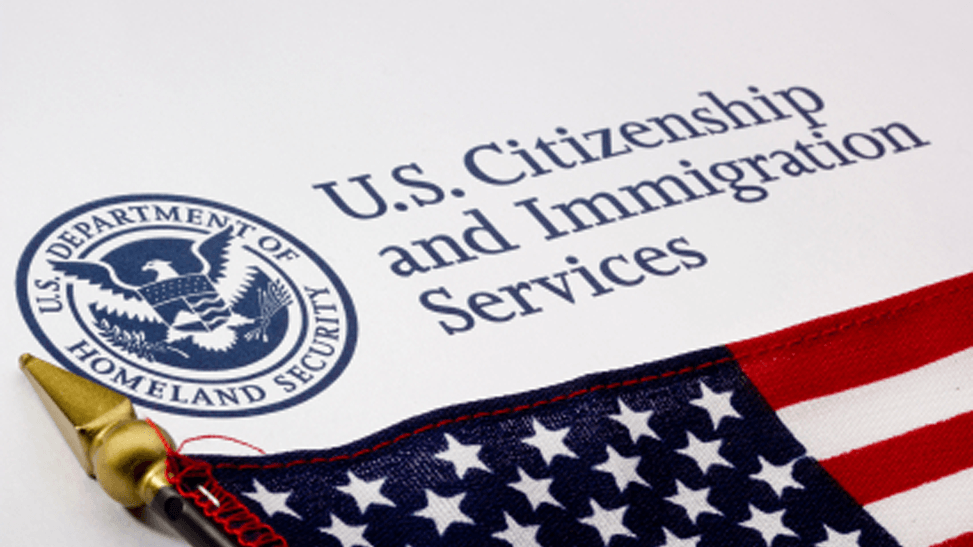Анжелика Райс, эсквайр.

Анжелика Райс, эсквайр.
Электронная почта: arice@santoslloydlaw.com

On March 31, 2024, U.S. Citizenship and Immigration Services (USCIS) implemented a policy update that limits gender marker selections on all immigration forms and systems to two biological sexes: male and female. This change eliminates the option for applicants to select a non-binary or “X” gender marker—an option that had previously been permitted on some forms. While USCIS emphasizes that this update does not change who qualifies for immigration benefits, it may significantly impact how certain applications—particularly asylum claims based on gender identity-related persecution—are understood and evaluated. What Has Changed? Under the revised policy, applicants may now only choose “Male” or “Female” when completing USCIS forms. The ability to select a non-binary or third-gender option is no longer available. Applicants may still request to change their gender marker with USCIS, but only within the male/female binary. Supporting documentation, such as medical or legal records, is not required to make the change. This means that transgender individuals can still align their gender marker with their identity—if it falls within the two binary categories—but non-binary individuals are no longer represented. The change follows guidance issued by the federal Office of Management and Budget (OMB), which called for greater consistency in the collection of sex and gender data across federal agencies. Impact on Asylum Applicants This policy update is especially important for individuals applying for asylum based on persecution related to their gender identity. Under U.S. immigration law, asylum is available to people who have suffered persecution—or fear future persecution—based on their membership in a “particular social group.” This includes people targeted for being transgender, gender non-conforming, or otherwise not aligning with socially expected gender roles in their home country. Although the legal standard for asylum remains unchanged, the removal of the non-binary gender marker could make it harder for some applicants to clearly present and document their identity. In asylum cases, credibility and clarity are crucial. The ability to accurately reflect one’s gender identity on official forms can play an important role in establishing the foundation of a persecution claim. Now, applicants who identify as non-binary or outside the traditional male/female categories may be forced to select a gender that does not align with their lived experience. This could lead to confusion in their case file or require additional explanation during interviews or hearings. This policy could weaken the strength of some asylum claims—not because the underlying facts have changed, but because the official forms now fail to reflect the applicant’s true identity. For example: A non-binary person applying for asylum after being targeted in their home country may now have to select “Male” or “Female” on their asylum application, despite not identifying as either. This mismatch may lead adjudicators to question the applicant’s identity, possibly weakening the strength of the claim or requiring added clarification and documentation. In defensive asylum cases—where applicants are in removal proceedings—such inconsistencies could create unnecessary hurdles and complicate the evidentiary presentation. What Can Applicants Do? Despite the change, individuals can still pursue asylum based on gender identity. The underlying eligibility criteria remain the same. However, applicants should be prepared to clearly explain any differences between their stated identity and the gender marker required on USCIS forms. Applicants are encouraged to: Include a personal declaration explaining their gender identity in detail and how it relates to their fear of persecution. Provide evidence such as affidavits, country condition reports, or expert testimony that supports the claim. Work with an experienced immigration attorney who can help present the claim effectively and prepare for any questions that might arise from the new form limitations. The new USCIS policy on gender markers may seem like a technical update, but for asylum seekers fleeing gender-based persecution, it has real implications. While individuals are still legally eligible to seek protection, the limitation to binary gender options could make it more difficult to fully and clearly present their case. If you or someone you know is facing immigration challenges related to gender identity—or is concerned about how this policy may impact an asylum claim—please contact Santos Lloyd Law Firm to schedule a consultation with one of our experienced immigration attorneys. We’re here to help ensure your voice is heard and your case is handled with the care and expertise it deserves.

In January 2025, the U.S. government introduced a mandate requiring all individuals without legal status in the country to register with federal authorities. This initiative aims to enhance national security and ensure compliance with existing immigration laws. If you or someone you know is affected by this change, it's essential to understand the specifics of this requirement and how to comply. Who Is Already Registered? Many individuals have already fulfilled their registration obligations through prior interactions with U.S. immigration authorities. You are considered registered if you have been issued any of the following documents: Lawful Permanent Resident Card (Green Card) Form I-94 or I-94W (Arrival/Departure Record), even if the period of admission has expired Immigrant or nonimmigrant visa issued before arrival Employment Authorization Document (EAD) Border Crossing Card Additionally, if you have applied for lawful permanent residence using forms such as I-485, I-687, I-691, I-698, or I-700, even if the applications were denied, or if you were paroled into the U.S. under INA 212(d)(5), you have met the registration requirement. Who Needs to Register Now? If you have not been registered through any of the means mentioned above, you are required to register under the new mandate. This includes: Individuals aged 14 or older who were not registered and fingerprinted when applying for a visa and have remained in the U.S. for 30 days or longer. They must apply before the expiration of those 30 days. Parents or legal guardians of children under 14 who have not been registered and have been in the U.S. for 30 days or longer. They must register their children before the 30-day period ends. Any individual who turns 14 years old in the U.S. and was previously registered. They must apply for re-registration and fingerprinting within 30 days after their 14th birthday. Notably, American Indians born in Canada who entered the U.S. under section 289 of the INA and members of the Texas Band of Kickapoo Indians who entered under the Texas Band of Kickapoo Act are exempt from this requirement. How to Register The U.S. Citizenship and Immigration Services (USCIS) is developing a new form and process for registration. Starting February 25, 2025 , individuals required to register should create a USCIS online account in preparation for the registration process. Once the process is implemented, registrations will be submitted through this online account. Important Considerations Registration Is Not an Immigration Status: Completing the registration does not grant any immigration status, employment authorization, or other rights or benefits under U.S. law. Consequences of Non-Compliance: Failure to comply with the registration requirement may result in fines, imprisonment, or both. At Santos Lloyd Law Firm, P.C., we are committed to guiding you through this process with compassion and expertise. Our trusted immigration lawyers are here to provide the information and assistance you need during this time. For personalized guidance and support, please contact Santos Lloyd Law Firm, P.C., and speak with one of our experienced immigration attorneys. We are dedicated to helping you navigate these changes and securing a hopeful future.

On January 28, 2025, Secretary of Homeland Security Kristi Noem vacated the January 10, 2025, decision by former Secretary Alejandro Mayorkas that had extended the 2023 designation of Temporary Protected Status (TPS) for Venezuela and ordered that his January 17, 2025, notice re-designating Venezuela TPS be vacated. This action has understandably caused confusion and concern among Venezuelan TPS beneficiaries and those with pending applications. It is critical to clarify that this does not mean that the TPS program for Venezuela has been eliminated . Instead, the Department of Homeland Security (DHS) must now reconsider whether to re-designate (extend) or terminate the previous Venezuela TPS designations from 2021 and 2023. What Does the Vacatur Mean? Because the January 17, 2025, TPS extension was vacated, the most recent valid TPS designation for Venezuela remains the October 3, 2023, designation . The vacatur does not immediately affect TPS protections for individuals covered under the prior designations. However, DHS must make key decisions in the coming months: By February 1, 2025 , DHS must decide whether to extend or terminate the October 3, 2023, designation . By July 12, 2025 , DHS must decide whether to extend or terminate the March 9, 2021, designation . If the Secretary does not make a timely determination (for example, if the Secretary were not to make determination by February 1, 2025 whether to extend or terminate the 2023 Venezuela TPS designation), then the statute provides for an automatic extension of the designation for an additional period of 6 months . INA 244(b)(3)(C), 8 U.S.C. 1254a(b)(3)(C). Until these decisions are made, TPS remains in effect under the previous designations , and those who have already been granted TPS are not immediately impacted. Who Is Affected and What Should You Do? Current TPS Holders If you were already granted TPS under the March 9, 2021, or October 3, 2023, designations, your status remains valid. You must continue to comply with all re-registration requirements to maintain your protection and work authorization. Re-registration period: TPS beneficiaries under the 2021 and 2023 designations must re-register between January 17, 2025, and September 10, 2025 , to maintain their legal status and work authorization. Individuals with Pending TPS Applications as of January 17, 2025 If you applied for TPS before January 17, 2025 , under a previous designation, your application will continue to be processed . If your application is approved, your TPS protection will remain valid at least until April 2, 2025 . There is no need to reapply. Individuals Who Applied for TPS Between January 10, 2025, and January 28, 2025 If you applied for TPS during this period, USCIS will cease processing your applications and issue refunds of any fees paid in association with those applications . Additionally, USCIS will invalidate EADs; Forms 1-797, Notice of Action (Approval Notice); and Forms 1-94, Arrival/Departure Record (collectively known as TPS-related documentation) that have been issued with October 2, 2026 expiration dates under the January 17, 2025 Mayorkas Notice. What Happens Next? Given the Biden administration’s prior support for TPS, many expect DHS to extend or re-designate Venezuela for TPS rather than terminate it . However, no final decision has been made , and Venezuelan nationals with TPS or pending applications should continue to follow updates closely. What Should You Do Now? If you currently hold TPS , continue to comply with all TPS renewal requirements and remain aware of DHS’s upcoming decisions. If you have a pending application , check USCIS updates regularly and consult with an immigration attorney for the latest guidance. If you applied between January 17, 2025, and January 28, 2025 , seek legal counsel to understand how the vacatur may affect your application. Stay Informed and Get Legal Guidance Our immigration firm is closely following these developments and will provide updates as soon as DHS makes its decision. If you have questions about your TPS status or how this memo affects your case, contact our office today for a consultation. For more information, refer to the official DHS notice on the vacatur: Vacatur of 2025 Temporary Protected Status Decision for Venezuela .
Анжелика Райс хорошо разбирается в иммиграционном законодательстве и обладает редким видением ведения своих дел. Будучи бывшим прокурором ICE Министерства внутренней безопасности, Анжелика имеет опыт общения с адвокатами противоположной стороны и понимает их точку зрения. Она опытный судебный адвокат, основной деятельностью которого является представление интересов клиентов в USCIS и Иммиграционном суде. В юридической фирме Santos Lloyd Анжелика занимается семейными делами, такими как изменение статуса, предоставление убежища, натурализация, I-751 (Устранение статуса), I-601 и I-601A Отказ от прав, I-212, I-589 и I- 730. Также третья категория в процессе иммиграционного суда. Анжелика также имеет опыт представления клиентов по бизнес-иммиграции и занимается делами по бизнес-иммиграционной визе, такими как O-1B, O-1A, EB-2 NIW, EB-1A, E-2. Юридическое прошлое Анжелики чрезвычайно разнообразно. До прихода в Santos Lloyd Law Анжелика была директором иммиграционного отдела небольшой иммиграционной юридической фирмы в Майами, Флорида, работала младшим адвокатом в известной фирме по семейному праву, а также руководила залом суда в своей предыдущей должности юриста. Помощник главного юрисконсульта офиса ICE Министерства внутренней безопасности в Лос-Анджелесе, Калифорния. Сочетание опыта Анжелики и юридического образования делает ее уникальной квалификацией для решения любых иммиграционных вопросов. Образование и достижения Юридический факультет Университета Св. Томаса, доктор юридических наук, 2016 г. Окончил с отличием, 2016 г. Вице-президент по вопросам конкуренции, судебная группа, 2015–2016 гг. Внесен в список декана, 2014–2016 гг. Награжден книжной премией CALI, 2016 г. Член Peter T. Fay Inn of Судебный университет Флориды, бакалавр криминологии, 2013 г. Окончил с отличием, 2013 г. Занесен в список декана 2012–2013 гг. Член судебной группы. Лицензия адвоката штата. Допущен в коллегию адвокатов Флориды и имеет лицензию на юридическую практику в Иммиграционном суде США. Не допущен в коллегию адвокатов Калифорнии.





